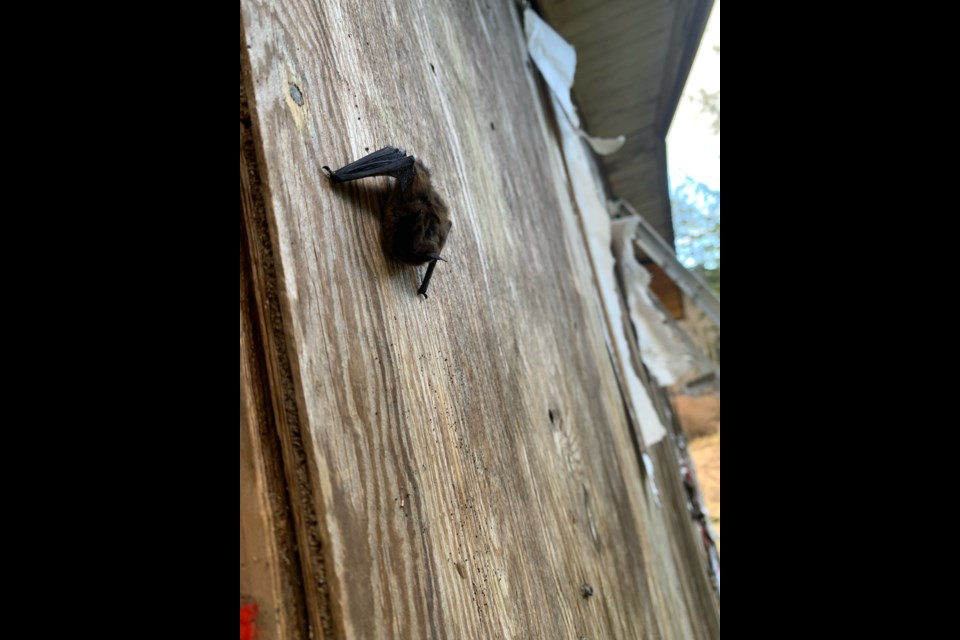BC Community Bat Program coordinator (BCCBP) Aimee Mitchell is the only scientist dedicated to the Powell River/qathet and Texada area to do bat monitoring. That’s why BCCBP depends on local bat ambassadors or citizen scientists to help monitor and report newly discovered bat populations, or dead bats in the region.
BCCBP has a coordinator in most regions of the province. Every year Mitchell [and crew] will visit the qathet region for population monitoring.
“We also collect guano in any colonies we know of, to identify species and to monitor for white-nose syndrome,” said Mitchell.
White-nose syndrome is a devastating fungus that has killed millions of bats in Eastern Canada. So far the fungus hasn’t hit the northern Sunshine Coast region yet, but it has killed 90 per cent of the colonies back east.
“The brown-nosed bat myotis are federally endangered even though they are a common bat here,” said Mitchell. “On the coast we have 10 species of bats, and so far the bats are doing well.
“There are not that many colonies [of bats] in Powell River; there is one on a floating cabin in Powell Lake.”
Recently a large colony was found on Texada Island during a home renovation.
“They roost in buildings because they have lost their traditional habitats, which would be large, hollowed out trees,” said Mitchell. “House roofs, attics and siding, that’s where they [bats] roost now.”
Mitchell said it’s fairly easy to coexist with bats.
“Our primary concern is making sure they don’t get into the living area,” she added. “They don’t chew or dig, they just take advantage of spaces that already exist.”
One of the biggest colonies in the Lower Mainland has 4,000 bats; the one found on Texada has 1,200, including juveniles.
“The females come back to the same place every year to have their pups; a maternity colony could be anywhere from 50 to over 1,000 bats,” said Mitchell. “For a little brown bat they are very loyal.”
Recently Mitchell did a site visit to Texada and that’s when the colony was found.
“They were redoing their roof, that’s usually when they are seen, when someone is renovating,” she said.
Mitchell wants to give praise to the company doing the renovation, as it is taking great care not to disturb the bats.
“I dropped off the four chamber colony bat boxes on Texada, they will be installed onto the house.”
The hope is that the bats will relocate to the bat box. The bat program has so far installed another four boxes in the qathet region in various locations. Mitchell advises residents to contact BCCBP to request a bat box, as the boxes from garden stores are not usually built properly for what bats need.
“We try to engage land owners as much as possible; citizen bat ambassadors are a big part of the program,” said Mitchell. “We do counts at the float cabin on Powell Lake, but the owner does most of it [counting] and they submit the data every year.”
One of the surprising facts most people don’t realize about bats is that, “they are long-lived, the record is 45 years old.”
“They have a low reproductive rate, they are not flying mice,” added Mitchell. “If a colony is destroyed or there is mortality, it can have a significant impact on the population.”
Bats are great at pest control because of the huge amount of insects they eat, including agricultural pests, forest pests and mosquitos. They are also pollinators.
Although the fungus is killing bats in the east, it hasn’t been found in the qathet region yet.
“There was a confirmation in Grand Forks, so now it is officially in BC,” explained Mitchell.
Luckily there has been some innovative research happening to possibly mitigate the spread of the fungus that will inevitably make its way across BC.
“We are looking into treatment measures, and are in the testing and research stage for a probiotic to put on the bats, to help them,” said Mitchell. “For a preventative measure we would like to apply the probiotic to the bats and hopefully reduce mortality.”
Mitchell said that’s why it’s important to identify as many colonies as they can, and why citizen science is so important.
“We are still in the testing phase but it looks promising.”
BCCBP is currently asking for the public’s help in reporting dead or sick bats. November 1 to May 31 is the surveillance period. People are warned against touching bats with bare hands (bats carry rabies, which is highly contagious). To find out more about the bat program and how to help, go to bcbats.ca.




